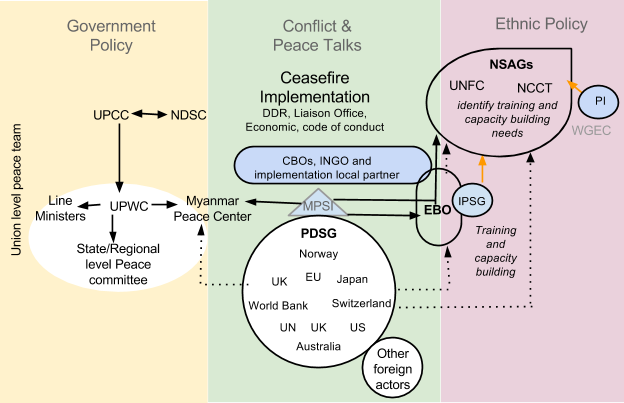Government
|
|
Armed Groups
|
|
led by:
Union Level Peace Team Enter the legal fold:
- give up arms/transform into BGF → now allowing ethnic armed groups to keep their arms
- set up a political party
- contest in elections myanmar peace monitor myanmar peace monitor myanmar peace monitor
Govt peace plan
|
|
Led by:
UNFC, United Nationalities Federal Council
- political talks (according to the 2008 federal constitution drawn by ethnic and democratic opposition groups)
- union accord – agreement on power sharing and resource sharing = amending the 2008 constitution
- approval from parliament
UNFC peace plan
|
|
Peacemaking bodies
Central Committee Policy making Body
- Chaired by President Thein Sein
11-members including:
- Vice President U Nyan Tun (replaced U Tin Aung Myint Oo, Aug.16, 2012)
- Vice President Dr. Sai Mauk Kham
- Speaker of the Upper house U Shwe Mann
- Speaker of the lower house U Khin Aung Myint
- Commander-in-Chief of the Defense Services Vice Senior-General Min Aung Hlaing
- Minister of Home Affairs Lieutenant-General Ko Ko
- Defense Minister Lieutenant-General Wai Lwin (replaced General Hla Min)
- Border Affairs Minister Lieutenant-General Thet Naing Win (replaced Lieutenant-General Thein Htay)
- Attorney-General Dr. Tun Shin
- Director of President’s office U Min Zaw
Working Committee Implementing Body
Myanmar Peace Center Secretariat
|
|
UNFC members
Ceasefire 6 members:
- KNU, Karen National Union
- KNPP, Karenni National Progress party
- SSPP/SSA-N, Shan State Army-North
- CNF, Chin National Front
- NMSP, New Mon State Party
- PNLO, PaO National Liberation Organization
Non-Ceasefire 5 members:
- KIA, Kachin Independence Army
- NUFA, National United Front of Arakan
- WNO, Wa National Organization
- LDU, Lahu Democratic Union
- PSLF/TNLA, Palaung State Liberation Front/ Ta-ang National Liberation Army
- *KNO, Kachin National Organisation (merged with KIO)
|
|
Transformed Armed Groups
- DKBA BGF 1011 to 1022 Kayin State Democracy and Development Party (KSDDP): 2 elected MPs
- KDA PMF 3 to 7, runs businesses and carries out development projects
- KNG PMF
- KNU Peace Group 1 elected MP, USDP member
- KNU Peace Force BGF 1023 Kayin State Democracy and Development Party (KSDDP)
- KNDP, KNPDP, KNPLF, KNUSO BGF 1004 & 1005, Business groups
- NDA-K BGF 1001, 1002, 1003, 1 elected MP.
- PNO Pa-O National Organization party: 8 elected MPs
- PSLF PMF Mann- pan & Mann Ton, Ta-Aung (Palaung) National Party (TPNP): 2 elected MPs
|
|
Non-UNFC
following the UNFC’s leadership
- ALP, Arakan Liberation Party, aka Rakhine State liberation Party (involved in WGEC)
- DKBA-5, Democratic Karen Buddist Army- Brigade 5
- (follows KNU’s political leadership)
- KPC, KNU/KNLA Peace Council
- (UNFC unofficial observer)
- KNLP, Kayan New Land Party (UNFC observer of the, under pressure from the govt to transform into a PMF (April 7, 2010) but continues to function as a ceasefire group)
unofficially following UNFC principles and plan
- UWSA, United Wa State Army
- NDAA-Mongla National democratic Alliance army
- RCSS/SSA-S, Shan State Army-South
- AA, Arakan Army
- ABSDF, All Burma Student’s Democratic Fron
- MTUF, Mergui-Tavoy United Front
Others
- NSCN-K, National Socialist Council of Nagaland – Khaplang (primarily demanding economic and social development for their area)
|
|
International Actors
Others
|
|
CBOs and NGOs
Monitoring
- e.g. Mon Regions Peace Monitoring Group, Shan Women Action Network, Karenni Civic Society Network
Policy and peace advocacy
- e.g. Women’s League of Burma, White Holding Hands, Peace Network, Kachin Peace Network, Generation Wave
Peace talk Facilitators
- Karen Peace Support Team Shalom Foundation
Ceasefire implementation
- CIDKP, Committee for Internally Displaced Karen People
- KORD, Karen Office for Relief and Development
- SRDC, Shan Relief and Development Committee
|

